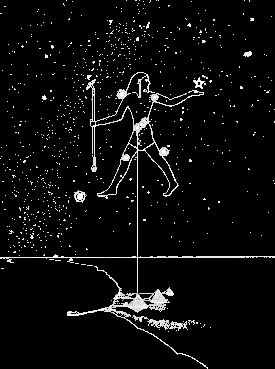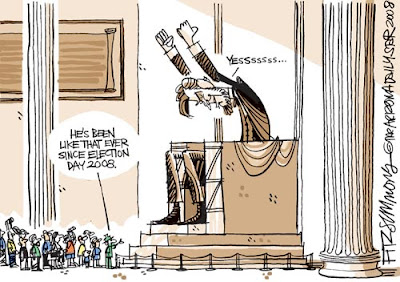(Editor's note: This is the second segment in a multi-part series titled A Blueprint for America's Future.
The underlying theme highlights the iconic presidential election
of 1912, which some believe contains the true blueprint for America's
future. The first segment traces Theodore Roosevelt's exit from the Republican Party and the foundation of his new "Progressive" or "Bull Moose" Party.)
Many times, over the years, T.R. compares the machinery of politics to the workings of a kaleidoscope.
At times brilliant colors and harmonious patterns can be seen, sometimes carefully shaken into shape, sometimes forming of their own accord. At the slightest hitch, however, brilliance and harmony can fall into jagged disarray, leaving the viewer with clashing colors, shapes and shafts of impenetrable black.
Many times, over the years, T.R. compares the machinery of politics to the workings of a kaleidoscope.
At times brilliant colors and harmonious patterns can be seen, sometimes carefully shaken into shape, sometimes forming of their own accord. At the slightest hitch, however, brilliance and harmony can fall into jagged disarray, leaving the viewer with clashing colors, shapes and shafts of impenetrable black.
T.R. knows
that his third party candidacy is a long shot and that he would not likely
win. But he sees it as his duty. “My public career will end next election
day,” T.R. tells a visitor in the days
preceding his new party’s own nominating convention.
He asks his
wife to say what she thought of his situation.
A house guest relates that “She was quite radiant with trust and
affection, as she expressed her faith that the path through honor to defeat was
the one to take.”
T.R.’s transformational embrace of faith cause
critics to suggest at the Progressive National Convention in August 1912 that
Progressivism is a religion. He nurtures
the theme that he is engaged in Holy Work.
Familiar church hymns
ring through the course of the proceedings, which are also held in Chicago, as the delegates
sing and chant, surging the religiosity in the hall to the point of delirium.
Onward Christian soldiers, marching as to war,
With the cross of Jesus going on before.
In his acceptance
speech for the party nomination, entitled A
Confession of Faith, T.R. repeats what he had stated earlier at the
Republican National Convention, to a tumultuous response: “I say in closing
what in that speech I said in closing: We stand at Armageddon, and we battle
for the Lord.” A New York Times reporter writes that “It was not a convention at
all. It was an assemblage of religious
enthusiasts.”
The mocking prophecy
of Eliju Root, US
Senator, R-NY, and formerly T.R.’s Secretary of War and then Secretary of
State, appears to have been fulfilled: “He aims at a leadership far in the future, as a sort of
Moses and Messiah for a vast progressive tide of a rising humanity.”
 Jane Addams, a proponent of women’s suffrage, says that
“I have been fighting for progressive principles for thirty years. This is the biggest day in my life.” The convention commits the Progressive Party
to a vast program of social, economic and environmental reform. T.R. has
made Progressivism a “moral” issue, entitled to use a superlative when
he calls the program “much the most important public document promulgated in
this country since the death of Abraham Lincoln.” The
Progressive motto is to be “Pass prosperity around.”
Jane Addams, a proponent of women’s suffrage, says that
“I have been fighting for progressive principles for thirty years. This is the biggest day in my life.” The convention commits the Progressive Party
to a vast program of social, economic and environmental reform. T.R. has
made Progressivism a “moral” issue, entitled to use a superlative when
he calls the program “much the most important public document promulgated in
this country since the death of Abraham Lincoln.” The
Progressive motto is to be “Pass prosperity around.”
In
his vision of a moral society, ethically based, T.R. poses
that the
Material progress and
prosperity of a nation are desirable chiefly so long as they lead to the moral
and material welfare of all good citizens.
Just in proportion as the average man and woman are honest, capable of
sound judgment and high ideals, active in public affairs, --- but, first of
all, sound in their home, and the father and mother of healthy children whom
they bring up well, --- just so far, and not farther, we may count on
civilization a success.
The soldier, or
ordinary citizen, has to have the right stuff in him. He has to have “the fighting edge, the right
character. The most important elements in
any man’s career must be the sum of those qualities which, in the aggregate, we
speak of as character.”
We must have the right kind of
character --- character that makes a man, first of all, a good man in the home,
a good father, and a good husband --- that makes a man a good neighbor. You must have that, and, then, in addition,
you must have the (right) kind of law and the (right) kind of administration of
the law which will give to those qualities in the private citizen the best
possible chance for development.
It comes as no
surprise that the platform of the Progressive Party of 1912 amounts to a
re-drafting of T.R.’s New Nationalism program. It is not matched again for initiative and
specificity in detail until the platform of the Democratic Party in 1964.
-Michael D'Angelo
(Editor's note: The third segment in this multi-part series takes the reader on a spiritual journey, as events --- which may only be described here as psychic --- unfold in the weeks leading up to the 1912 general election ...).
(Editor's note: The third segment in this multi-part series takes the reader on a spiritual journey, as events --- which may only be described here as psychic --- unfold in the weeks leading up to the 1912 general election ...).




